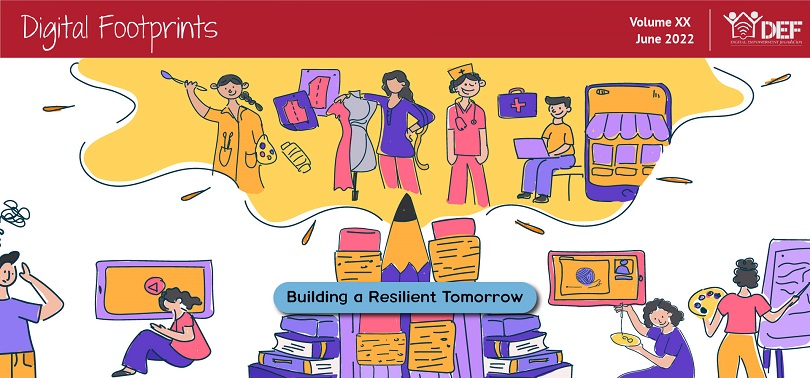


Across India a common usage of the phrase, “Today’s children are tomorrow’s future”, is heard in many households. But the question of understanding how to prepare these young adults today hasn’t always been thought through in these households. As the world keeps changing at a much faster rate and gets more complex, those trying to keep up are often bewildered and confused about the choices that lay ahead. Read More


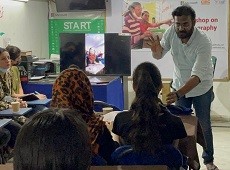
Globalisation has normalised cross country movement to a large extent adding an explorative value addition to the cultural exchange that follows. While most of us cherish such an experience, it often slips from our minds that the international diaspora has many other unsettling shades waiting to be seen. “Papaya! What’s a papaya? Is one of the many surprised expressions seen among the refugee girls who have been residing here for years but have the least exposure outside our community. Many have not even been to a single mall since they have been in India!” says Ahmad Khan Anjam, leader of Afghan refugees residing in Jangpura region of Delhi. Read More



SoochnaPreneur have often proved to be the source of help and the most necessary contact in the hour of need for many across India apart from serving the role of information providers. They have truly served the purpose of bridging the gap between provision of benefits and access as the SoochanPreneurship program was designed to deliver. But DEF’s logs are replete with many stories of these SoochnaPreneurs who have shown new light to those in search of it. One such recipient was 38 year old Babita Devi who has been working as a farmer in her ancestral land in order to financially support her family and lends a hand to her husband, a local vegetable seller. Read More

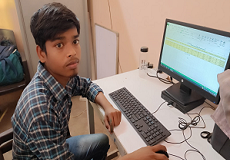
The younger generations are always buzzing with new ideas and energy to learn and experiment. All they are usually looking for are platforms like FLIP or opportunities to channel it into something progressive. Such a simple, yet crucial step makes a very big difference in their lives adding more confidence and positive attitude towards building their lives professionally and personally. Junaid is a 17 year old resident of Ghazipur village, Delhi. Junaid wanted to help the family financially, looking at the struggles. But he never had the opportunity to use the internet for online banking, marketing or filling forms of government schemes. Read More

There is never an age barrier when it comes to learning. Especially post pandemic, the need to transition businesses into a new digital arena has driven many entrepreneurs to learn about digital tools. But quite often, majorly in rural areas, although the drive to learn has been observed lately, many find it hard to gain access to the right resources to help them in this direction. Functional Literacy Course is one such initiative by DEF that caters to this need in a structured and guided way and has helped many businesses to thrive on new grounds. Faisuddeen is an entrepreneur from Chanderi district of Madhya Pradesh. Chanderi town is popular for its sarees with traditional weaving families found on almost every street. Read More
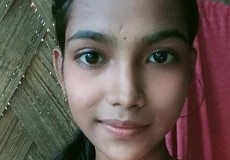
The active participation seen across India by both genders in the science stream is something that has recently gained momentum. However, the gender ratio in advancing in such a field is still struggling to look promising even on a global scale. The main challenge has been the stigma around science subjects being difficult to grasp. The only way to bust such a myth is by encouraging young students to explore this stream. DEF has been trying to head this way by introducing a STEM for girls program. Riya Das Gupta is a student of Raha Girls High school, studying in her 10th grade and enrolled in the STEM for girls program. Read More

Compared to earlier times when the profession and associated skills were passed down within the family, in current times, scenarios being very different, children have to rely on outside resources to understand the path and efforts needed to pursue their ambition. When the right guidance is available at the right time, young adults succeed to become independent and responsible citizens. But when they don’t find the right way forward, they often get lost and slip into confusion and a state of hopelessness which reflects in their personality too. Therefore, providing such clarity through continuous engagement under programs like STEM for Girls, has much higher value and potential to drive a change in the scene of rural areas in India. Read More


SoochnaPreneur is an initiative of Digital Empowerment Foundation to create digital women entrepreneurs who provide access to vital information to their communities along with earning an income for themselves. DEF has set up nearly 1,500 SoochnaPreneur centres across 24 states of India with the primary aim of bridging the information and digital divide. Nearly 1,000 of these SoochnaPreneurs are women; we identify women to become SoochnaPreneurs to empower women in rural parts of the country. Mewat is a region in Haryana and Rajasthan with a close proximity to New Delhi, the capital of the country, however, it is one of the most marginalised regions of the country. With a very low female literacy rate it is one of the most challenging regions to work in for DEF. Read More


Risk Communication and Community Engagement is a program that Digital Empowerment Foundation has been doing with the support of UNICEF. The program aims to spread health awareness amongst people across the country using various methods such as community meetings, youth engagement, wall paintings, announcements, WhatsApp messaging and door to door engagement. With a cadre of 885 volunteers across 90 districts in 18 states of India, DEF has been able to reach more than 6.5 million people through this program. The learnings from the volunteers are insightful and highlight the challenges they faced as they tried to make their own communities more aware about the spread of the pandemic and the importance of the vaccine. Read More


Last week, in yet another planned communally charged incident against the country's minority Muslim community, several lawsuits were filed claiming a Shivling was found beneath the Gyanvapi mosque in Benaras. After demanding the mosque be sealed, and hearings at the Supreme Court, the issue remains sensitive and volatile. The streets had slogans (Ayodhya) To Kewal Jhaanki Hai, Mathura Kashi Baaki Hai (Ayodhya is just the teaser, Mathura and Kashi are still left), one of the old war cries of India's extreme right-wing. The internet was ripe with hate-filled messages and disinformation, but also with memes regarding the alleged absurdity of the claim. In the process, a history professor at Delhi University posted on Facebook on the issue, and got arrested for hurting 'religious sentiments.' Read More

On February 2021, as the Swedish climate activist Greta Thunberg tweets about the farmers' protest in India, it starts to get a sudden rise in international coverage. One week later, a 22-year old climate activist, Disha Ravi was arrested by the Bangalore Police, charged with sedition charges- section 124A (and others) for plotting to “promote disaffection against Indian state.” They claimed she 'contacted activists abroad,' and was part of creating some 'online toolkit' that apparently 'brought shame to India.' Following protests, international condemnation, and legal procedures, she was released on bail about a week later. Not everyone is like Disha. In October 2020, while India was shocked to hear of a caste atrocity, the rape and murder of a young girl in Hathras district in Uttar Pradesh... Read More
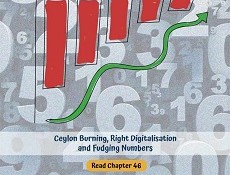
Last week, the World Health Organisation released a report that said all countries, India included, have misreported the fatalities from COVID-19, and that the numbers are much higher than previously expected. In India's case, the numbers were closer to 10X. If these numbers are hard to understand, this six-panel sketch from Sanitary Panels would help put things into perspective: While the WHO now says the global death toll is closer to 15 Million, India has of course refuted the claims. The BBC Report from the above tweet explains why India's total count may never be known: About half the total deaths occur at home, especially in villages. Poor record-keeping means that out of 10 million deaths every year - based on demographic studies and estimated by the UN... Read More
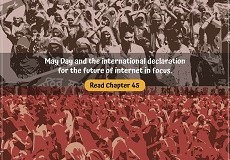
This week is International Workers' Day and we also look into the joint declaration on the future of the internet. On April 28, the United States, European Union member states, and 32 non-EU countries announced a “Declaration for the Future of the Internet.” It envisages the internet to be decentralised and globally connected, one where signatories “refrain from undermining the technical infrastructure essential to the general availability and integrity of the internet.” How far does the declaration actually manage to go, given the nature of their call? One of the criticisms that were pointed out by the Association of Progressive Communications (an international network of civil society organisations... Read More
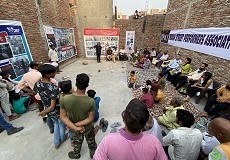
Disappearing acts are quite popular among the magicians, but when the act is heading towards becoming quite literal, threatening an end to the long standing art form among street performers, they go looking for much more than just an applause. One such street performer with an international exposure, Ishamuddin, from the Madari community, an A-CODE fellow, is trying to get enough attention to the community of street magicians so that he can revive the art form conforming to the present status quo. Currently, the Madari community has been stigmatised as a needy community rather than seen as a group of people performing on the street for a living. Read More




This month we have started a new series of DEFDialogues in association with A-CODE, our new collective. This weekly series features linguists, economists and development practitioners.

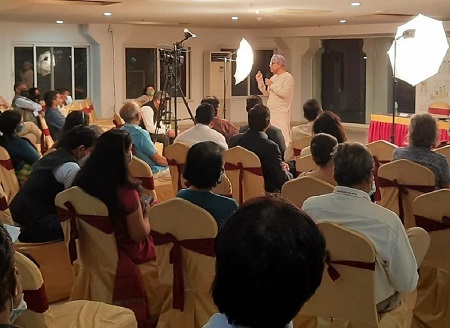

“Many of us have had international recognition. But right now, we are at the brink of losing our artforms to poverty” said Ishamuddin Khan in an article published by CNN in 2020. During an interview for the DEF Dialogue series, Khan tells us that the situation of street performers continues to remain bleak and also reveals historic, parliamentary decisions that have contributed to such conditions. For generations, Indian peripatetics have enthralled their viewers by walking on tightropes, materialising pigeons out of cane baskets and making bears stand on their hind legs. There are seven performing tribes in India – jugglers, acrobats, magicians, snake charmers, animal trainers, impersonators and street singers – and all are similarly disenfranchised. These tribes pass down the knowledge of their art to their successors who, the former hope, will carry it forward. None of them, however, are recognised as artists even though they are practitioners of an age-old artform that is unique to our culture. Khan is a street magician and can depict the history of the universe... Read More
With the onset of the third wave we are crowdfunding digital devices so that underprivileged students are not deprived of education like they were during the first two waves of the pandemic.
info@defindia.org | def@defindia.net



